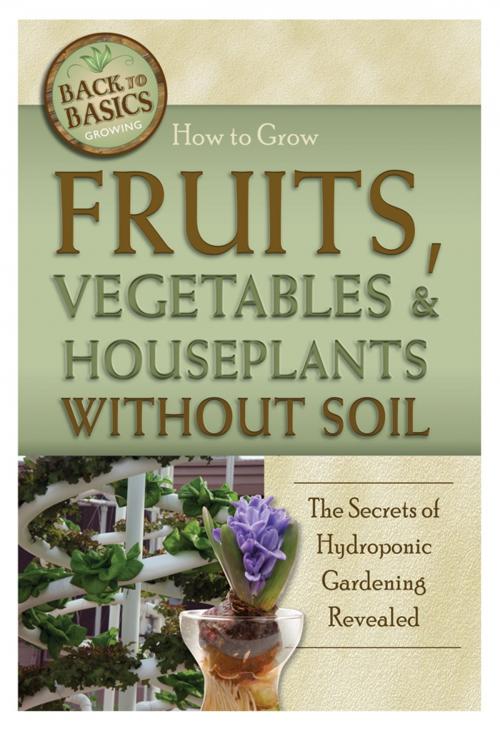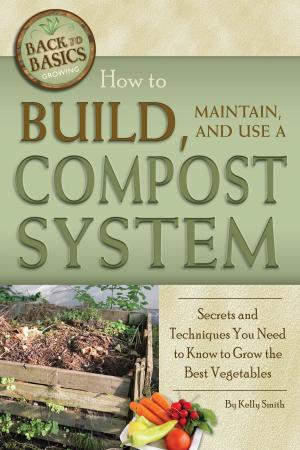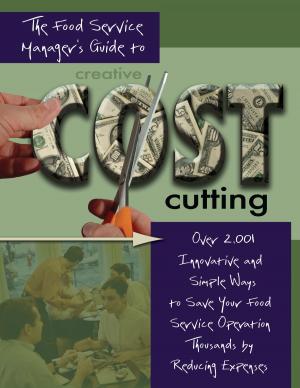How to Grow Fruits, Vegetables & Houseplants Without Soil: The Secrets of Hydroponic Gardening Revealed
Nonfiction, Home & Garden, Gardening, Organic, Techniques| Author: | Richard Helweg | ISBN: | 9781601388582 |
| Publisher: | Atlantic Publishing Group | Publication: | December 30, 2014 |
| Imprint: | Atlantic Publishing Group Inc. | Language: | English |
| Author: | Richard Helweg |
| ISBN: | 9781601388582 |
| Publisher: | Atlantic Publishing Group |
| Publication: | December 30, 2014 |
| Imprint: | Atlantic Publishing Group Inc. |
| Language: | English |
Dirt-free, low-cost, space-saving, low in pesticides, and environmentally friendly, hydroponic gardening the art of growing plants without any soil is a method already used by millions for growing healthy, vibrant plants by everyday gardeners. In Greek, hydro translates to water and ponos translates as labor, meaning that your garden lets the water do the work of feeding nutrients to your plant no soil necessary. This technology allows your plants to grow with nutrient solutions, with its roots free or supported by means like peat moss, sawdust, or gravel. The result is high yield production with a growth rate that is 30 to 50 percent faster than a soil-based plant grown under the same conditions, according to the Pacific Agri-Food Research Centre. You don't have to be a professional horticulturalist to learn how to grow soil-free in your own home. For anyone who was ever turned off by traditional gardening because of inconvenience or messiness, hydroponic gardening offers an attractive and practical alternative. Your fruits, vegetables, flowers, and other foliage can flourish without their roots being buried unnecessarily in layers of restrictive, water-wasting soil. According to The Green Living Journal, growing plants and crops without soil requires only 1/20 to 1/30 the amount of water needed with conventional gardening, saving you on both the costs of soil and water. With How to Grow Fruits, Vegetables, & Houseplants Without Soil as your step-by-step guide, you can learn how to set up your own hydroponic garden right in your backyard, greenhouse, or windowsill. And with science showing that soil-less gardening results in higher yields and much less water waste, hydroponics are on their way to becoming the primary gardening method of the future though this technique has been used for centuries. If you want to start your own low-maintenance, healthy garden, this book has everything you need to take you from seed to sprout and beyond. Using this heavily researched book, you will learn every detail behind why and how hydroponic gardening works, and what tools you will need to get started. Discover the long history behind this alternative method, and find out what plants and crops flourish the most without soil. You will learn how to prime your plants for growth, as well as how to deal with pests or any other garden hindrances. Learn about both the pros and cons of soil-less planting, as well as the various materials you can utilize to enhance growth and support your plants roots, such as gravel, clay, mineral solutions, and aeroponics. You can understand how to harness the power of natural and artificial light to nurture the growth of your plants, as well as how to use the best environmentally safe and organic methods and media for your green garden. This book features a multitude of in-depth interviews with scientists, hobbyists, and greenhouse-savvy experts who will teach you the secrets behind starting and maintaining your new, innovative hobby. And if you want to turn your hydroponic hobby into an income-producing garden, this book will show you how. Whether your garden comprises a few window-sized containers or multiple sprawling greenhouses, you can learn how hydroponics can inexpensively and easily fit your gardening goals.
Dirt-free, low-cost, space-saving, low in pesticides, and environmentally friendly, hydroponic gardening the art of growing plants without any soil is a method already used by millions for growing healthy, vibrant plants by everyday gardeners. In Greek, hydro translates to water and ponos translates as labor, meaning that your garden lets the water do the work of feeding nutrients to your plant no soil necessary. This technology allows your plants to grow with nutrient solutions, with its roots free or supported by means like peat moss, sawdust, or gravel. The result is high yield production with a growth rate that is 30 to 50 percent faster than a soil-based plant grown under the same conditions, according to the Pacific Agri-Food Research Centre. You don't have to be a professional horticulturalist to learn how to grow soil-free in your own home. For anyone who was ever turned off by traditional gardening because of inconvenience or messiness, hydroponic gardening offers an attractive and practical alternative. Your fruits, vegetables, flowers, and other foliage can flourish without their roots being buried unnecessarily in layers of restrictive, water-wasting soil. According to The Green Living Journal, growing plants and crops without soil requires only 1/20 to 1/30 the amount of water needed with conventional gardening, saving you on both the costs of soil and water. With How to Grow Fruits, Vegetables, & Houseplants Without Soil as your step-by-step guide, you can learn how to set up your own hydroponic garden right in your backyard, greenhouse, or windowsill. And with science showing that soil-less gardening results in higher yields and much less water waste, hydroponics are on their way to becoming the primary gardening method of the future though this technique has been used for centuries. If you want to start your own low-maintenance, healthy garden, this book has everything you need to take you from seed to sprout and beyond. Using this heavily researched book, you will learn every detail behind why and how hydroponic gardening works, and what tools you will need to get started. Discover the long history behind this alternative method, and find out what plants and crops flourish the most without soil. You will learn how to prime your plants for growth, as well as how to deal with pests or any other garden hindrances. Learn about both the pros and cons of soil-less planting, as well as the various materials you can utilize to enhance growth and support your plants roots, such as gravel, clay, mineral solutions, and aeroponics. You can understand how to harness the power of natural and artificial light to nurture the growth of your plants, as well as how to use the best environmentally safe and organic methods and media for your green garden. This book features a multitude of in-depth interviews with scientists, hobbyists, and greenhouse-savvy experts who will teach you the secrets behind starting and maintaining your new, innovative hobby. And if you want to turn your hydroponic hobby into an income-producing garden, this book will show you how. Whether your garden comprises a few window-sized containers or multiple sprawling greenhouses, you can learn how hydroponics can inexpensively and easily fit your gardening goals.















